You’re in a pickle. You need to communicate with a French person but don’t speak French. If you’re lucky, the person speaks better English than you do French and is not too shy to give it a go. You should be very grateful. You should also know that you’re still in a cornichon. This is the second article in the series Lost in Traduction – things you didn’t know you’d have to translate in France.
I want to be very clear about the intention of this article – it is a guide whose only objective is to improve communications between Francophones and Anglophones. As we’ve seen recently by the valiant efforts President Macron made to speak English in public, there is ample ground for misunderstanding, even when English words are used (like ‘delicious’). I don’t mean to criticize him in the least. Au contraire! President Macron is more eloquent in English than the majority of our native speakers. He, and every other Francophone, should be encouraged to speak English, right? But if we stare back at them with confused looks, or heaven forbid giggle at them, they’ll probably be sorry they even tried. So, this is a primer for us Anglophones who are lucky enough to have a French person speak to us in English. They’ve already met us more than half way. Now it’s up to us to figure out what they mean.
1. Words they think are English
Just like we think we sound cool sprinkling French words into our conversation, the French like to do the same with English. The only problem is when the Anglicism either doesn’t exist in English or means something different. It seems that the French believe adding the suffix ‘ing’ to a word makes it English (like we add o’s to words to make them Spanish). So here are some words that French people may think you understand:
- Baskets – tennis shoes/trainers/sneakers (no joke)
- Brushing – a blow-dry
- Jogging – a pair of sweatpants/track suit
- Sweat – a sweatshirt
- Pressing – a dry cleaner
- Footing – a jog
- Parking – a parking lot/car park
- Self – a self-serve establishment
- Smoking – a tuxedo
- String – a thong or G-string
- Dressing – a walk-in closet
- Relooking – a make-over
- Planning – a schedule or agenda
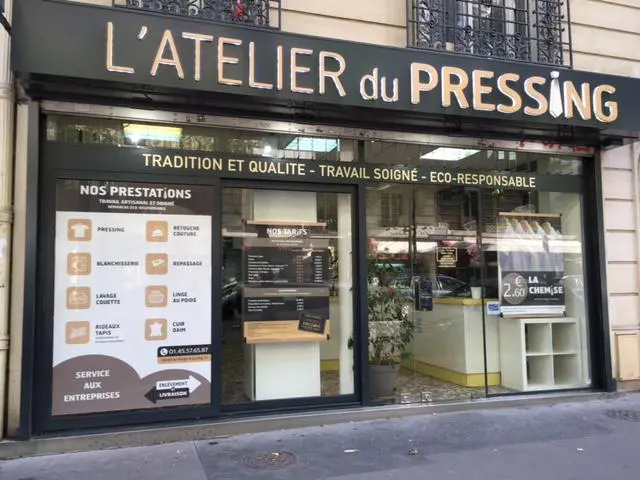
A French dry cleaner (© Mappy)
2. Words that are English but you’d never know
Most of these are confusing because they don’t sound the same coming from a French mouth, except the first one. Ordering food items with English names becomes a surreal experience in France, as you try to say them the way they do:
- Talkie-Walkie – they just wanted to switch it around, keep it fresh
- Wi-Fi – ‘wee-fee’
- Hi-Fi – a bit dated now, but same trouble with the short I, sounds like ‘hee-fee’
- Has been – an actual expression in English that means the same thing in French, but sounds like ‘azbeeen’
- McDo – short for McDonald’s, of course, but they say ‘MacDoh’
- Smoothie – have fun ordering this one, unless you say ‘smoossy’, they won’t get it
- Brownie – ‘broh-ny’
- Thriller – you know, Michael Jackson’s best video ‘Treeler’
- Spiderman – ‘speederman’
- Colonel – well, here it’s the English pronunciation (kernel) that’s messed up, the French pronounce the word as it’s spelled
3. Faux amis
These are words that are similar in both languages but have different meanings:
- Douche – French word for shower…highly unlikely they’re referring to the other meaning!
- Menu – It’s not the paper you order from (la carte) but more of a ‘meal deal’
- Actually – Actuellement in French means ‘at this moment’ whereas it has a ‘despite what you may believe’ connotation in English. I had a good chuckle one time while waiting for a delayed flight in France. The airline employee first announced in French that the flight was boarding now, and then said in English ‘the flight 123 is actually boarding.”
- Eventually – Eventuellement means ‘potentially/possibly’ in French, which is quite different from the English meaning of a certitude that’s just a matter of time.
- Preservative – Be careful of this one, as the French word for condom is préservatif.
- Slip – men’s underpants/briefs
- Tacos – This one makes me cry. For a long time the French referred to tortilla chips as ‘tacos’ and then they decided it was a fast food item. I’ll save you the heartache of dashed hopes…this abomination is more like a Hot Pocket than a taco! Check it out:
4. Letters left off
S:
This is one of the most confusing things for English speakers, since we pluralize words by adding an S to the end in almost all cases. The French use a plural article in front to indicate more than one item (les, des) and hardly ever pronounce the last consonant in ANY word. Pay attention to the context to make sure you know if the Francophone is referring to one or several, as even advanced speakers commonly omit the last S in a plural noun.
* Bonus tip: English words for foods often get an S ending, even when they’re singular – “You want one muffins/cookies/tacos?” I suppose this is overcompensation for the above.
H:
You wouldn’t think a tiny exhale could make such a difference, but it does! The letter H is never aspirated in French. They don’t even put an imaginary Y in front, as some English-speakers do (human) – it’s just completely silent. “You’re as useless as the H in Hawaii” is a wisecrack that only makes sense in French. So if your name starts with an H, you may not recognize it in French – you are now Ellen, Arry, or Eezer (Heathers have it rough). If you want a live example, ask your French friend to read aloud the word ‘hedgehog,’ and you’ll understand what I mean.
5. Letters added
H:
Words that start with vowels can also trip up French people. I’m not sure why, because they have them, too, but when a French person encounters an English word that starts with a vowel, they have a tendency to add an H in front. If you read the previous paragraph, you understand how bizarre this is. They don’t pronounce the H when it’s there, and sometimes add one when it’s not there! “What do you want to heat?” “She was quite hangry at me.” You can’t be too sensitive if your name is Evy…”Ah, you are Heavy – pleased to meet you!”
P, B, W, K:
Also ironic, the French often pronounce the (few) silent letters in English words. The P is pronounced in French words like psychologist, pneumonia, and pseudonym, so they tend to pronounce them in their English equivalents.
The silent B is less a problem when it comes after M (comb, thumb, climb), possibly because it’s the last letter and so naturally silent in French. However, in words like ‘debt,’ ‘subtle,’ ‘plumber,’ or ‘doubt,’ the B is often voiced.
When the French pronounce the silent W in words like ‘wrap,’ it sounds like a V. They are popular sandwich alternatives, so you need to say ‘vrap’ if you’re ordering one in France. In words like ‘who,’ the W sounds like ‘woo’ when pronounced.
There are very few words that start with ‘kn’ in French, so beginners in English may pronounce the K.
ED, ES (at the end of words):
They don’t really add these letters so much as they pronounce them much more than we do. ‘Managed’ becomes three syllables. Or they can leave them off altogether like with the S, leaving you to wonder which tense they mean – “I talk to John.” ?? An ES at the end also becomes an extra syllable. ‘Clothes’ sounds like ‘clozes,’ and ‘months’ is often said ‘monthez.’
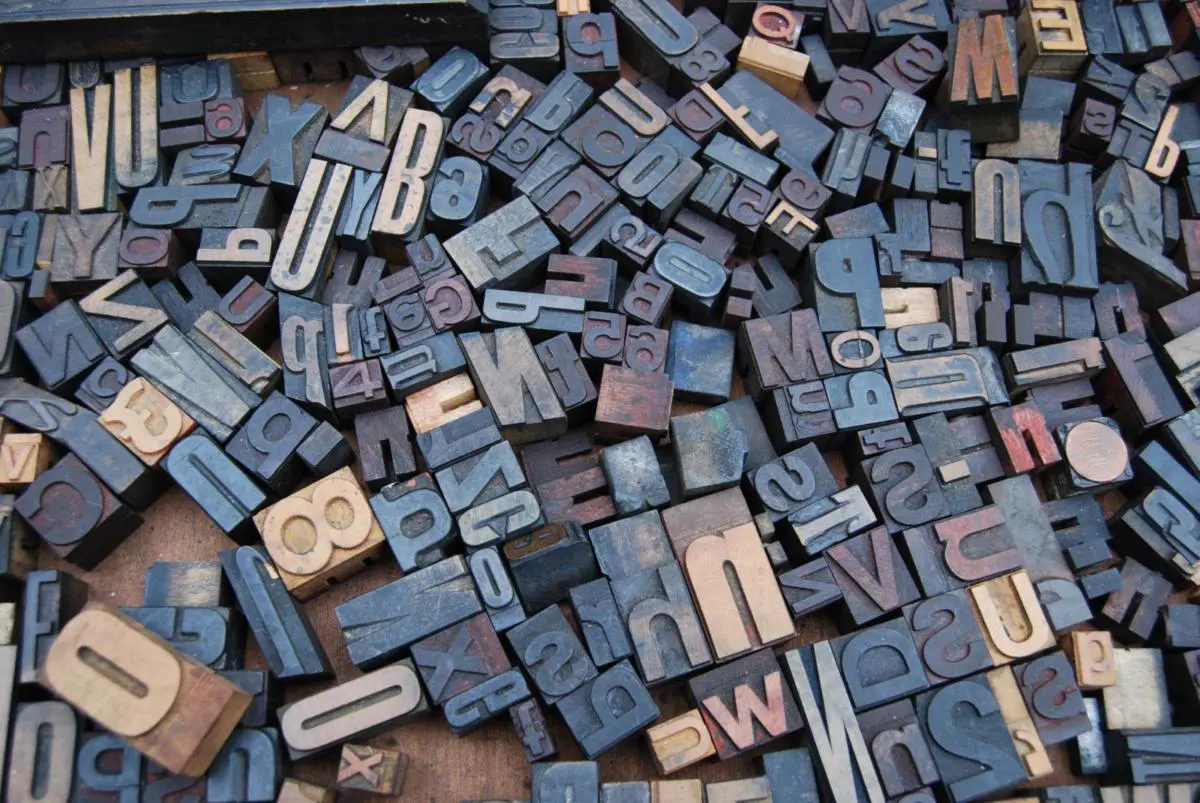
Photo by Amador Loureiro on Unsplash
6. Letters commonly mispronounced
Anyone trying to imitate a French accent knows that they have a signature way of pronouncing ‘TH’ and short ‘I’ sounds. To be fair, the letters below are problematic for other non-native speakers, too, not just the French. And lord knows that French has some letters that are nearly impossible for native English-speakers (I’m looking at you ‘R’ and ‘U’).
TH:
Most often sounds like ‘Z’ or sometimes ‘S’. Why is the ‘TH’ sound so hard for French mouths? Because they feel silly pushing their tongue out beyond their teeth. Out of self-consciousness, they keep the tongue behind the teeth and make the ‘Z’ sound instead.
I:
While they like to say the long I – “it’s my life!” – and have that sound in French (aïe), the short I is just insurmountable. The short vowel sounds in English, and the shwa, don’t really exist in French, but the short I is the biggest trouble-maker. Even the most advanced speakers will say ‘sheep’ for ‘ship’ and ‘green’ for ‘grin.’ As I mentioned in Part 1 of this series, a French person using the words ‘sh*t’ or ‘b*tch’ is more likely to confuse than offend.
CH:
These letters form a ‘SH’ sound in French, so it can be hard to tell if the person is saying ‘choose’ or ‘shoes’ in English. When the French want to capture the same CH sound, they put a T in front, like to tchat, because ‘chat’ with the ‘sh’ sound is ‘cat’ in French.
J:
Like many languages, French has no hard J sound, as in jungle or Jewish. If you prepare your ear to expect the softened ‘zh’ version (like in Zsa Zsa Gabor), you’ll probably understand the word without too much trouble.
LD:
I’ve noticed that the French have trouble with some ‘ld’ words. They manage alright with ‘bald’ and ‘older’, but ask one to say ‘it’s a real wild world’ and you’ll imagine Scooby Doo with peanut butter on his tongue.
R:
Let’s face it, Rs are a pain in most foreign languages! Just as we struggle with the French R, which is very slightly rolled at the back of the tongue, they can’t get their mouths around English Rs. Words like ‘rural,’ ‘rarely,’ ‘squirrel,’ and ‘hierarchy’ are pure punishment for a Frenchman. In fact, they’ll likely find substitutes for difficult R words whenever possible, so the letter may never cause you confusion when listening.
7. Confusing letters
If you are unsure of a word the French person has said, you could ask them to spell it…but there again you’re on treacherous ground! Even the letters of the alphabet don’t sound the same. I advise learning the international radio alphabet (https://www.icao.int/Pages/AlphabetRadiotelephony.aspx).
- J – pronounced ‘zhee’
- G – pronounced ‘zhay’
- Y – ‘e-grek’
- W – ‘double V’
8. Stressful syllables
With the mispronounced and left off letters, the misplaced syllable stress rounds out the Terrible Top 3 for sources of Anglo-French confusion. And you can’t blame the French for this one – their language follows simple rules for intonation…basically the last syllable is the one that’s stressed. In English, there are so many rules and exceptions that you have almost no chance of getting it right the first time you say a word.
- Develop – My pet peeve! Even nearly bilingual speakers will stress the first syllable. I’ve started a personal crusade to get at least Web Developers, who have the word in their job title for Pete’s sake, to pronounce it ‘de-VEL-oper’ rather than ‘DEV-eloper’.
- Focus – As the word is frequently used in international business, I’m far from the first person to notice the French mispronunciation and cringe. It’s about as prevalent as DEV-elope, but the ensuing confusion is much worse. Since the French pronounce it with an unstressed O and emphasize the second syllable, it invariably ends up sounding like ‘f*ck us.’ Awkward = being in a meeting where a French person tells someone they ‘need to focus.’
- Engineer – Stressing the second syllable of this word makes for another cringe-worthy mistake, as poor President Macron showed us in one of his first speeches in English. Saying ‘en-GINE-ner’ makes the word rhyme with ‘vagina.’ I’ll never be able to un-hear that one.
- Tomatoes – Harmless and cute after the last two, but we did lose some time trying to figure out what ‘tummy toes’ were…
- Lieutenant – Similar to our problem saying ‘vrap’, ‘lieutenant’ is a French word, so they’ll pronounce it like one. This means the last syllable is stressed (lieu-ten-ANT), and not the second one as in English.
9. Proper nouns
Some things are hard to learn new names or pronunciations for, especially because they often sound similar to the original you first learned. It’s kind of like with counting. I know all the numbers in French, but when it comes to counting or doing mental math, my brain is much more efficient in English.
- Countries – The ones that are close enough to confuse are the ones to watch out for. Chine, Japon, Inde, Maroc, Espagne, Norvège, Islande…sure, you can figure them out in written form, but this article is about the challenges of understanding a French person SPEAKING English.
- Cities/States – Londres, Pékin, Séoul, Le Caire, Mexico (a city in French!), Athènes, Naples, Sydney, Hong Kong, Detroit, Ohio, Hawaï… 😉
- Celebrities – Unrecognizable: Gwyneth Paltrow, Kirk Douglas, Hugh Hefner, Joaquin Phoenix, Matthew McConaughey, Halle Berry, Keira Knightley, Martin Scorsese, Charlize Theron…
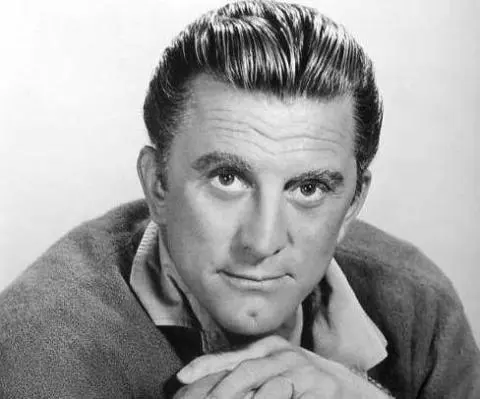
Kirk Douglas 1963 ©DR/Wikimedia Commons
10. French words you misunderstand
Here the confusion doesn’t stem from a difference in pronunciation, because the words are French – it’s just they don’t mean the same thing where we come from. They are faux amis from their side.
- À la mode – Means ‘in fashion’ and has nothing to do with ice cream.
- Bonne nuit – It literally translates as ‘goodnight’ but the French only say it right before literally going to bed.
- Bureau – It means office, like in English, but it’s also the word for ‘desk’ in French, so the meaning isn’t always clear (“eet eez in my bureau”).
- Entrée – It means either foyer or the first course of a meal in French. My mother and I went round and round with a waiter in Paris when he kept asking for our entrée order. We’d say steak, and he’d say “OK, but what do you want for your entrée??” The main course is called the plat principal in French.
- Toilette – refers to personal grooming in French, rather than the porcelain god (Eau de toilette is NOT toilet water). While a French person may be talking about an actual toilet, they usually call it a WC (pronounced Vay-Say) for water closet.
- Terrible – Perfectly normal that this word causes confusion, as it can mean either awful or fantastic in French. The only way to tell what the French person means, in either language, is by the context.
- Confuse – This means embarrassed or bothered in French, which can ‘confuse’ an Anglophone.
- To profit – This often has a positive connotation in French and means to enjoy or truly benefit from something. If a Frenchman asks whether you ‘profited from your vacation,’ he’s not asking whether you worked a side job or smuggled in some contraband.
- Courage – The French use this word a lot to mean fortitude or wherewithal rather than bravery. If someone has a lot of work to do, it’s common to wish them Bon courage!
- Bless – The verb blesser means to hurt or injure in French, not to bless or consecrate.
- Crayon – a lead pencil, not the colored wax thing
- Demand – As demander is the verb ‘to ask’ in French, there is a lot of room for misunderstanding here. Being asked, “what did you demand?” after asking a simple question can make you feel flustered.
- Grosse – Means really big or fat, NOT disgusting. (Note: it only sounds like the English word ‘gross’ when modifying a feminine noun)
- Arrive – The French use j’arrive to mean ‘I’m coming’ rather than to indicate arrival. It’s also very common to hear the verb arriver à to mean ‘to be able to.’ So if the French person in front of you says “I don’t arrive,” they mean they are trying to do something and not succeeding.
- Oh là là – Very common and basically the equivalent of ‘wow’ in French…no lascivious meaning by nature, but certainly can be if intended! 😉

This is not known as “à la mode” in France (© Bakers Square)
11. English words they commonly confuse
These errors are subtle but can still lead to confusion:
- Interesting vs. interested – “I’m very interesting in that subject.”
- Fun vs. funny – “We had a funny time at the party.”
- Sensitive vs. sensible – mix-ups are due to the fact that ‘sensible’ in French means sensitive!
- Learn vs. teach – “You learned me that.”
- Missing – “I’m glad you’re back. You missed me.” This verb works the other way in French.
12. Different perspectives
And finally, you won’t understand some things a French person says to you, regardless of the words they use, simply because they see the world differently.
Making a date: If today is Sunday, and a French person says “see you next Thursday,” they mean in four days. In English, we would mean Thursday of NEXT week, as opposed to THIS Thursday in four days.
Location: They are less precise between ‘here’ and ‘there’ than we are in English. When you call and the person answering the phone tells you “Elle n’est pas là”, they mean ‘she is not here’ even if the literal translation is ‘she is not there.’
Elevation: If you don’t already know, the floors/storeys or building levels work differently in Europe. The ground floor is zero, or rez-de-chaussée in French, and they start counting at the next level up. If your French friend tells you to meet her on the third floor, make sure you know which one she means before climbing all those stairs.
Possession: Since possessive pronouns agree with the object rather than the subject in French…hold on, sorry about that, I just channeled my inner grammar nerd! To put it simply, they don’t have different words for ‘his’ and ‘hers’ in French, so sometimes they’ll mix it up in English. It’s just like us with word genders – le table, la table, what’s the difference?
Genders: And because genders are an essential part of the French language, they tend to assign them to things that don’t have genders in English. I once heard a Frenchman get angry at a fly and call it ‘a beetch,’ for example.
Conclusion
It’s been said (not by me!) that it’s easier to learn French than to understand a French person speaking English. I would certainly encourage you to learn French, especially if you’re living in France, because it’s a rich and beautiful language. But if you feel that fluency is beyond you, I hope this comprehensive guide will make it easier on the French people indulging you by speaking English. 😉
If you can add some troublesome translations or pronunciations I’ve forgotten, I’d love to see them in the comments below.
Find the first “Lost in translation” article here.
Dennelle is the President of Renestance and a bilingual American who’s lived in France since 2000. She loves so many things about France, its language, culture, geography, quality of life... that she started a business to help others realize their dreams of living in this incredible place.
All articles by: Dennelle Taylor Nizoux

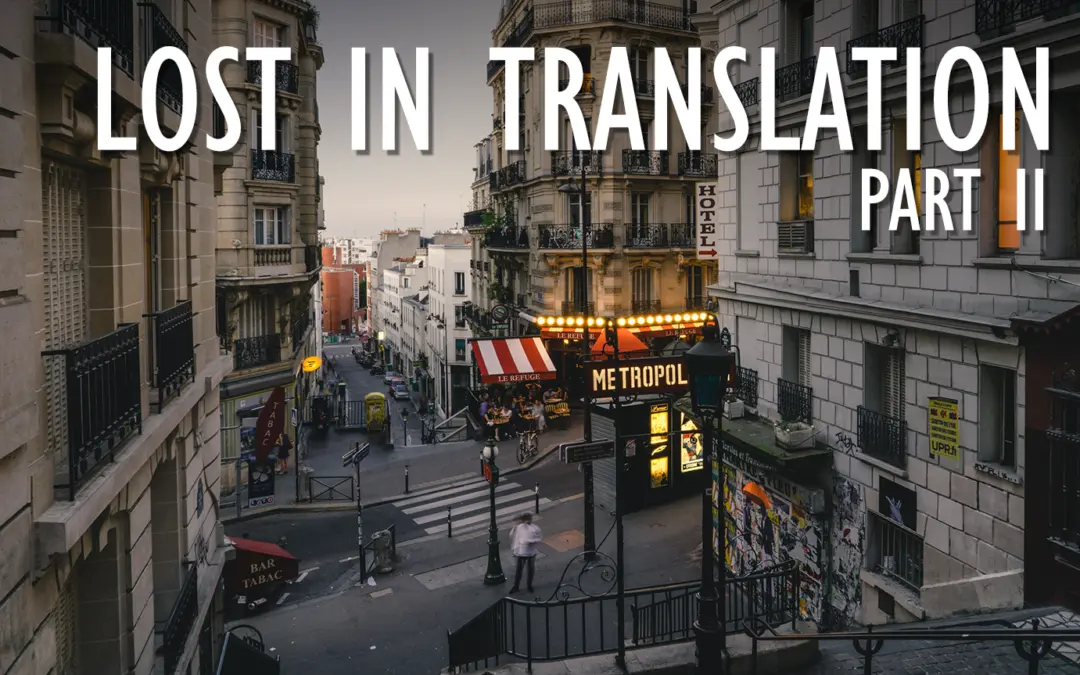
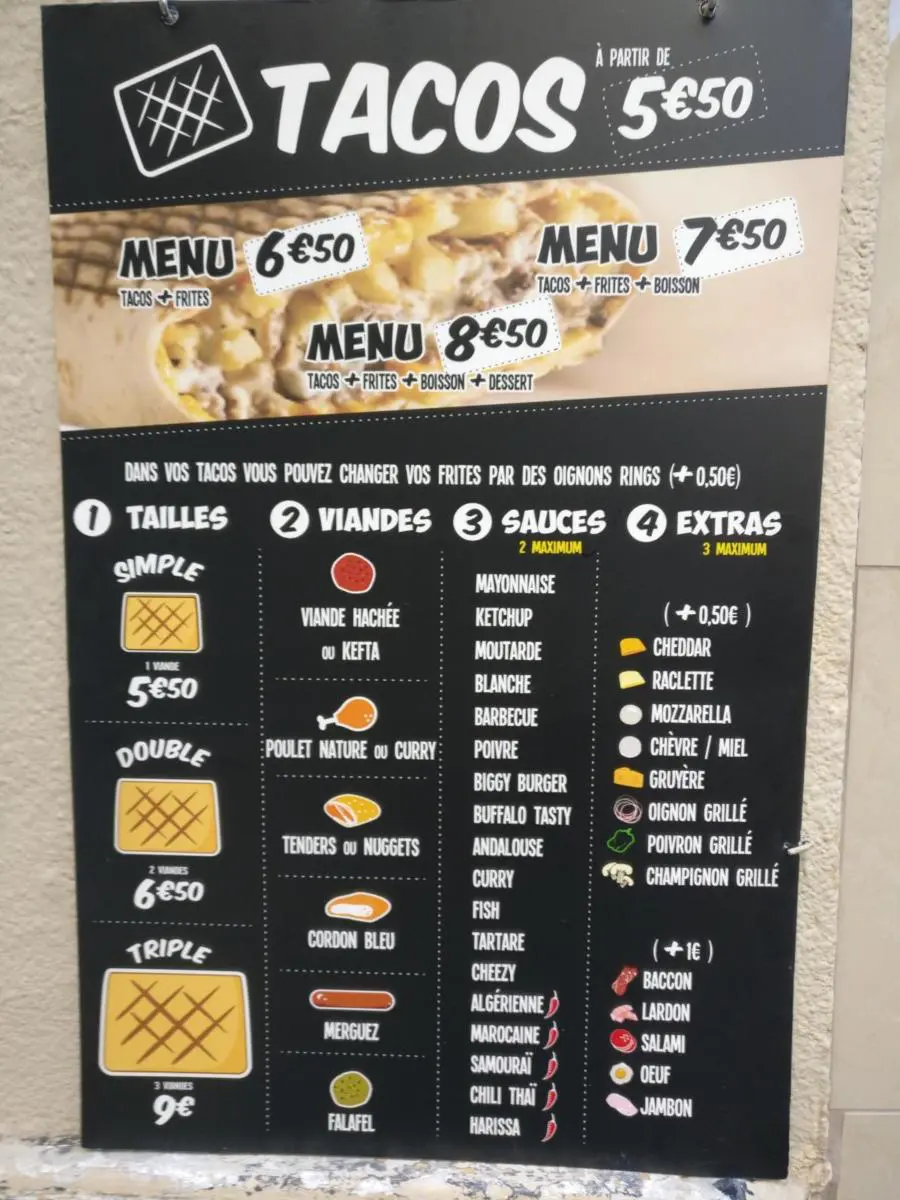

Julie
on 2018-05-27 at 20:22This a great article! Reminds me of the time I didn’t understand my coworkers asking me if I liked Mariah Carey’s music. They had to play it for me to understand which artist they were talking about. Blank faced English person indeed!
Exactly! Hilarious 😀
Kirsten Monteil
on 2018-05-28 at 10:28I absolutely loved this spot on article, well done indeed. I literally LOLed, which the French don’t seem to know it means, ‘laughed out loud’. Anyway, only one thing I would add or stress, (along the lines of ‘focus’, ‘preservative’, and the like. I often wondered why my French hubby always said ‘chat’, not ‘chatte’, when talking to or referring to our female feline, GiGi. No matter the sex of the beastie, better off saying ‘mon chat’ or you might raise a few chuckles.
Thanks, Kirsten! Yes, there are plenty of pitfalls for us in French, as well! Good topic for another article, and I’ve got loads of material from my own goofs :-p
Victoria Walker
on 2018-05-28 at 21:34Fabulous As Always, Denelle. You are so good at compiling and categorizing the things that native English speakers face in France, and helping to make sense of them.
The addition and omission of “h” can make for some interesting conversations. My childrens’ French father, to the confusion of many, announced “I ate howls.” As you can guess, he actually meant that he hates owls. (For some reason, he finds them creepy…)
One word that he can’t seem to get straight despite lots of teaching and explanation: he translates “heureusement” into “hopefully”, which can confuse listeners. (Not sure if that’s common among other Frenchmen or not.)
As for myself, I have difficulty deciphering when “toujours” means “always” vs “still,” when I hear someone say something like “Il est toujours la.” Context helps sometimes, but not always.
Thanks for the great article!
Thanks so much for your comment, Victoria. “I ate howls” – love it! As for those pesky adverbs ‘again’ ‘still’ ‘always’ etc… I think they are troublesome for foreign speakers of any language. Like prepositions, they are the artistic part of language and hardly ever translate literally. 😉
E Price
on 2018-06-05 at 14:35Please explain why the phrase ‘I have a pain in my neck’ is frequently subject to misinterpretation when translated/ badly pronounced in French. The English struggle to hear the difference between cou and cul…
Oh dear, that is a dangerous misinterpretation! :-p And common challenges English-speakers have when speaking French is a whole other blog, or book even! The quick answer is that U is pronounced ‘oo’ in English, which corresponds to sound made by ‘ou’ in French. The French pronunciation of U is much tighter and has no similar sound in English. The French U is for Anglos what the short I is for Francophones.
Mgx
on 2018-06-10 at 20:48In spite of what is said in the introduction, this article was a bit too condescending for my taste.
Will we have the reverse article with native English speakers struggling with French?
Also nowadays “Oh la la” is more used to make fun of English speakers trying to sound French than to express “wow”.
Thanks for the feedback, Mgx. As you said, the article was not written to be condescending in the least, but I did recognize that I was attempting something delicate. I made it light-hearted and had French friends read it first to make sure it didn’t ruffle any feathers. I’m very sorry that it ruffled yours.
As for mistakes we Anglophones make while speaking French, I said below that whole books could be written on the subject! For one, we used outdated expressions like Oh la la 😉 So far I’ve found that the French are much better at figuring out what we’re trying to say than the other way around…I suppose we have Jane Birkin to thank for that. If you’d like to attempt a tutorial to help French speakers decipher Anglophone-French, be my guest. I promise not to be offended.
“Hotel” in French is ubiquitous, but means something completely from its English faux ami.
Quite right, Paul. I remember an American saying she was staying at the ‘Hotel de Ville’ while in Paris. 😉 I don’t think I’ve heard a French person use ‘hotel’ in English to mean anything other than accommodation for tourists…have you?
Elisabeth Lavoie
on 2018-06-25 at 20:42Well done! The amount of work you put into it is commendable. It is neither condescending nor a delicate subject that cannot be touched. It’s real life and, if anything, it made me smile. Reminded me of a dinner at my house where a friend was too busy catching up on the latest news that she forgot to eat. When she realized that she was ‘behind’ she said ‘I’m going to heat it now’.
Kathy Janiec
on 2018-12-30 at 10:2535 years ago in Pau, it took 3 American girls 5-10 minutes to figure out what a French guy was talking about when he told us he he’d had a mou-fin. When we got it finally : muffin!, we rolled on the floor laughing much to his chagrin.
I’m going to share your article with my almost bi-lingual girls, born here of a French father, who want to go to the States for a summer job. Maybe it will help them understand some potential pitfalls. Thanks for your hard work!
That must have been hilarious, Kathy! I can imagine it well 😀 I hope your girls have a wonderful time in the States. Do you think it will change their accent in English? Will be interesting to see. Kind regards.
Michelle O
on 2018-12-31 at 06:26It’s my goal to get all my trainees to correctly pronounce, as you mentioned develops, bit also comfortable and vegetable (3 syllables not 4) it’s incredibly tricky for them but it sounds amazing when they get it right. Love it and they’re always so chuffed. Great article.
Thanks, Michelle. Yes, you’re right on with those examples! Our children have corrected their French father several times for ‘vegetables.’ 😉
Anne-Laure
on 2019-05-05 at 18:52Nice! As a native french speaker, I experienced some of those issues and some others:
– I remember having a lot of trouble making myself understood with “deaf”, as I remembered “leaf” and “beat” and thought the pronunciation would be identical. We stood there for almost one minute with me trying new pronunciations and pointing to my ears until it clicked… (Same for “ear” BTW)
– And what about “pour” and “flour” and “about”? Is there any rule for “ou”? ARgghh
– The short “i” is definitely a problem. And unlike the “th”, I think less of us are aware of its pronunciation. I didn’t realize it until not so long ago.
– Actually, Eventually and Sensible are REALLY troublesome, and I have to stop and assess every time I want to use them. 🙂
– As for the “h” that we add, but not in the right places, I think it’s more something of a “tongue cramp” that we get when speaking a language we are not used to…
– Let’s forget about stress. This concept is completely foreign to us french speakers.
– And I soooo miss “Bon courage !” and didn’t find any appropriate replacement yet… “Have fortuitude!?”
– Oooh and I still regularly assign genders to tables and objects (and animals). Because I conceptualize it like that.
The only thing I really want to add, is that you should definitely correct us (of course, without any condescension, so it might feel a bit tricky if you do not know well the person). Because it is incredibly difficult to improve if there is no feedback. Without interruptions, we just assume we were correct…
Or you can learn french! 😀
Merci beaucoup for your comments, Anne-Laure. All very true, and best of all, with humor! Learning a foreign language is definitely a subject to be taken lightly, just as we do with children learning to speak. I really appreciate your not taking offense, as a French anglophone, because it truly was not my intention to criticize or mock in any way. I have spent many years and countless awkward moments trying to learn French, so I know exactly how it feels to see and understand a word only to be completely lost when the same word is spoken! And no, I don’t believe there’s a rule for the pronunciation of ‘ea’ or ‘ou’…in that respect French is much easier than English because it mostly follows the rules (even if they make no sense to us foreigners at first – WHY don’t we pronounce half the letters?!). For what it’s worth, I also find myself searching for an English equivalent to ‘bon courage’ and many other handy French phrases. It’s a marvelous language! 🙂